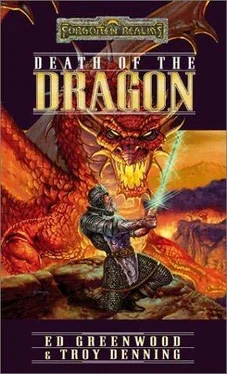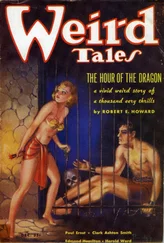Ed Greenwood - Death of the Dragon
Здесь есть возможность читать онлайн «Ed Greenwood - Death of the Dragon» весь текст электронной книги совершенно бесплатно (целиком полную версию без сокращений). В некоторых случаях можно слушать аудио, скачать через торрент в формате fb2 и присутствует краткое содержание. Жанр: Фэнтези, на английском языке. Описание произведения, (предисловие) а так же отзывы посетителей доступны на портале библиотеки ЛибКат.
- Название:Death of the Dragon
- Автор:
- Жанр:
- Год:неизвестен
- ISBN:нет данных
- Рейтинг книги:4 / 5. Голосов: 1
-
Избранное:Добавить в избранное
- Отзывы:
-
Ваша оценка:
- 80
- 1
- 2
- 3
- 4
- 5
Death of the Dragon: краткое содержание, описание и аннотация
Предлагаем к чтению аннотацию, описание, краткое содержание или предисловие (зависит от того, что написал сам автор книги «Death of the Dragon»). Если вы не нашли необходимую информацию о книге — напишите в комментариях, мы постараемся отыскать её.
Death of the Dragon — читать онлайн бесплатно полную книгу (весь текст) целиком
Ниже представлен текст книги, разбитый по страницам. Система сохранения места последней прочитанной страницы, позволяет с удобством читать онлайн бесплатно книгу «Death of the Dragon», без необходимости каждый раз заново искать на чём Вы остановились. Поставьте закладку, и сможете в любой момент перейти на страницу, на которой закончили чтение.
Интервал:
Закладка:
Vangerdahast frowned. “Have you been reading my mind?”
The dragon broke into a raucous chuckle, and clouds of boiling sulfur hissed into the plaza.
Vangerdahast waited until its mirth died away, then said, “Your point, I suppose, is that you do know the nature of this place?”
The yellow membranes closed over the basin in a sort of reptilian wink. “A long time I have been here,” it said, “but you-even if there was food, humans do not live so long. If you are to leave, I think it must be with me.”
Vangerdahast studied the beast for a moment, considering the kind of havoc he would unleash by helping such a creature escape. If the thing truly was as old as it appeared, its magical abilities would rival his own-and he had already seen what its fire breath could do. On the other hand, Cormyr was doomed without him, especially with the ghazneths loose and Princess Tanalasta still infatuated with that lowly ranger she had met-kin to the traitorous Cormaerils, he was, and a ground-splitting Chauntea worshiper as well.
Vangerdahast unclasped his hands and started down the stairs. “I suppose you have a name?”
“I do,” replied the dragon, “but no human could understand it. You may call me Nalavara.”
It was all Vangerdahast could do to avoid falling again. The name came almost directly from a chapter of Cormyr’s earliest history-and not a very proud chapter at that.
“Something is wrong, wizard?” rumbled Nalavara.
Vangerdahast looked up and saw he had stopped moving. “Not at all-just weak with hunger.” Hoping that Nalavara had not been reading his mind, he started down the stairs again. “But I would like to hear your full name, if I might.”
The dragon’s huge eye membranes drew closer together. “Why?”
“Human translations are so graceless.” Vangerdahast reached into the component pockets inside his weathereloak and withdrew a pinch of salt and another of soot, then rubbed them between his fingers and uttered a quick little spell. “My understanding of Auld Wyrmish might surprise you. I have a special fondness for the beauty of the language.”
“Do you?” Nalavara’s eye remained narrow, but her long lips twisted into a crocodile’s smile. “Very well.”
She rattled off a long series of rumbling growls and fire-like crackles that Vangerdahast understood perfectly as Nalavarauthatoryl the Red.
“So, human, do you like my name?” asked Nalavarauthatoryl the Red.
“Sorry, didn’t understand a word.” Actually, Vangerdahast understood better than he would have liked. The name wasn’t Auld Wyrmish at all but ancient Elvish. The phrase meant something like “the maiden Alavara, betrothed of Thatoryl, painted in blood.” He forced a stupid smile and added, “The human ear can be a bit flat.”
“One fault among many,” Nalavara agreed. “And you are called…?”
“Elminster,” Vangerdahast replied, lying through his teeth. “Elminster of Shadowdale. Now, how do we get out of here?”
Nalavara’s eye widened to its normal proportions, which was to say about as broad and long as a spacious work table. “First, Elminster, you must wish for something to eat. You will need a clear head for the work to come.”
“Work? You must be jesting,” Vangerdahast scoffed. “That’s why I have a ring of wishes-and I’m not about to waste the last one on a pot of porridge.”
An angry shudder shook the stairs, then Nalavara rumbled, “One wish only?”
“Only one, so be certain of yourself.”
Vangerdahast was not exactly lying. The truth was he had no idea how many wishes remained to the ring. It had been handed down to him through a long line of royal magicians, and if any of them had ever known the number it contained, the secret had died long before it reached Vangerdahast.
“Tell me what to wish,” the royal magician said, “and I’ll have us out of here.”
A long ribbon of flame snorted from Nalavara’s distant nostril. “A fool I am not,” she rumbled. “Come and bind yourself to my horn, and I will tell.”
Vangerdahast did as he was asked, but the horn was as large as a tree trunk, and even his over-large belt was not long enough to reach. He explained this to Nalavara, then wrapped his arms around the horn and said, “I give you my word I won’t let go.”
Nalavara snorted angrily, then said, “Be warned-if you try to leave me behind, the wish will not work.”
“Leave you behind?” Vangerdahast echoed. “Never. My word is as good as my name.”
“That is less of a comfort than you think, Elminster,” the dragon rumbled. “Know that if you try to cheat me-“
“Yes, yes, I can imagine,” Vangerdahast said. “You will look me up in Shadowdale, and I shall forever after have reason to regret my perfidy. Now, are we going to cast our wish or not?”
“Very well,” grumbled Nalavara. “The secret is not to wish us out of the city, but to wish the city back in time. You must call upon the ring to fill it again with goblins.”
“Goblins?”
“The Grodd Goblins,” Nalavara said. “That returns the city to the time when goblins ruled the land. From there, we must use our own spells to travel to our own times-have you a time-walking spell?”
“No,” Vangerdahast grumbled. “Though it hardly matters.”
He released the dragon’s horn and jumped off her head, then started down the plaza filled with disappointment and despair. Had there been any real chance of the spell working, Nalavara would certainly have insisted on holding him in her mouth-then she’d bite him in two once the wish was made.
“Wait!” Nalavara boomed. “Without me, the spell will work not!”
“And not with you either,” he called back. “Whatever you want, Nalavara, it isn’t to be free of this place. Red dragons are not so trusting.”
To Vangerdahast’s great surprise, Nalavara did not explode into a fit of anger. Instead, she began to chuckle, shaking the plaza so violently he lost his footing and had to sit.
“Come now, Elminster,” she rumbled. “You know I am more than a dragon, and I know you are not who you claim to be.”
Seeing that the virtues of deception had long exhausted themselves, Vangerdahast also began to laugh, a deep, mad laugh begot more of weariness and despair than humor-but a laugh nonetheless. He was one of only two men living who knew the name Alavara and what it meant to Cormyr, and it struck him as absurdly funny to find himself trapped alone with her in a deserted goblin city.
Lorelei Alavara was an elf maiden, quite beautiful by all accounts, who had lived in the Wolf Woods when the first humans began to intrude. She had been betrothed to Thatoryl Elian, a handsome young hunter foolish enough to argue with a band of human poachers over whose arrow had killed a bear. The argument ended only when Thatoryl became the first Wolf Woods elf to be murdered by human hands. Lorelei Alavara’s grief knew no bounds, and she plotted constantly with King Iliphar to make war on the humans and drive them from the land. It was she who organized the slaughter of Mondar Bleth in the days before Cormyr was a kingdom, and who slew a thousand humans more before her own kind grew weary of her obsession with vengeance and, a century after the first murder, finally banished her to the Stonelands.
That much of the story was told to every member of the royal family as soon as they reached the age of majority, but there was more, passed only from royal magician to royal magician and told only to the ruling monarch since the founding of the kingdom. Thatoryl Elian’s murderer had been Andar Obarskyr, brother to the founder of Cormyr, Ondeth Obarskyr, and uncle to the first king, Ondeth’s son Faerlthann.
According to the story passed down to Vangerdahast, Andar had escaped retribution by virtue of good luck, having been tending to nature’s call deep in the woods when the elves came to avenge their kinsman’s death. Though the massacre had left Andar too frightened to ever again set foot in elven territories himself, he had told his brother many times of the bounty of the Wolf Woods, and those descriptions were what convinced Ondeth to build a new home beyond the frontier. That Cormyr’s birth had resulted from such a miscarriage of justice had been the kingdom’s most jealously guarded secret for more than fourteen centuries now, and Vangerdahast could not help chuckling at the thought that the dragon had actually hoped to make him the instrument of its divulgence.
Читать дальшеИнтервал:
Закладка:
Похожие книги на «Death of the Dragon»
Представляем Вашему вниманию похожие книги на «Death of the Dragon» списком для выбора. Мы отобрали схожую по названию и смыслу литературу в надежде предоставить читателям больше вариантов отыскать новые, интересные, ещё непрочитанные произведения.
Обсуждение, отзывы о книге «Death of the Dragon» и просто собственные мнения читателей. Оставьте ваши комментарии, напишите, что Вы думаете о произведении, его смысле или главных героях. Укажите что конкретно понравилось, а что нет, и почему Вы так считаете.












